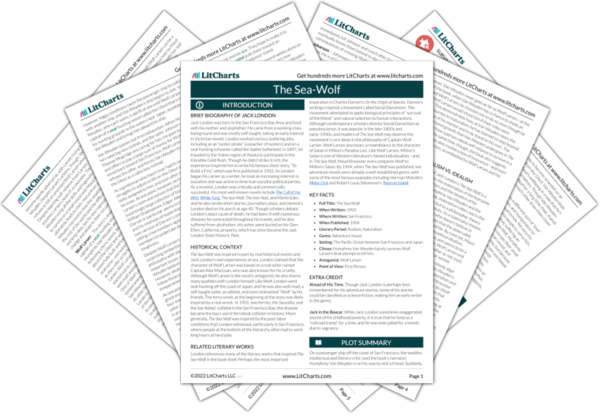At the heart of Jack London’s The Sea-Wolf is a conflict between the materialism of the fearsome captain Wolf Larsen and the idealism of his captives, the literary critic Humphrey Van Weyden and the poet Maud Brewster. In the book, materialism refers not to the selfish pursuit of material wealth, but to a philosopher theory that the material world is all that exists. As a materialist thinker, Wolf Larsen is essentially an atheist who doesn’t believe in souls or eternal life—rather, he believes that the observable world is all there is and all there ever will be. By contrast, Maud Brewster’s more closely align with philosophical idealism, which means that she does believe in souls and seems to be a committed Christian. Throughout the book, Wolf Larsen and Maud Brewster frequently argue about whether or not souls exist, and none of their debates ever has a clear winner.
Though Humphrey Van Weyden’s beliefs more closely align with Maud Brewster’s idealism, in many ways. Van Weyden’s philosophical stance falls somewhere between materialism and idealism. For instance, when Wolf Larsen and Maud Brewster are arguing about what causes humans to act as they do (Wolf suggests that desire drives action, while Maud suggests that soul drives action) Van Weyden proposes a compromise by saying that desire and the soul are just two ways of looking at the same thing. Ultimately, London seems to suggest that the extreme materialism of Wolf Larsen leads to misery, as Wolf suffers from a secret affliction throughout the book and ultimately dies, weakened and alone. Nevertheless, Wolf makes some powerful challenges to Van Weyden and Maud’s ideas, raising philosophical objections and, when that doesn’t work, sometimes resorting to physical violence. Ultimately, though, the back-and-forth nature of the conflict between Wolf’s materialism and Van Weyden and Maud’s idealism suggests that a full understanding of human nature requires elements of both materialism and idealism.
Materialism vs. Idealism ThemeTracker

Materialism vs. Idealism Quotes in The Sea-Wolf
Then a most surprising thing occurred. The captain broke loose upon the dead man like a thunderclap. Oaths rolled from his lips in a continuous stream. And they were not namby-pamby oaths, or mere expressions of indecency. Each word was a blasphemy, and there were many words. They crisped and crackled like electric sparks.
“I believe that life is a mess,” he answered promptly. “It is like yeast, a ferment, a thing that moves and may move for a minute, an hour, a year, or a hundred years, but that in the end will cease to move. The big eat the little that they may continue to move, the strong eat the weak that they may retain their strength. The lucky eat the most and move the longest, that is all. What do you make of those things?”
Where there is room for one life, she sows a thousand lives, and it’s life eats life till the strongest and most piggish life is left.
“No,” Wolf Larsen answered, with an indescribable air of sadness. “And he is all the happier for leaving life alone. He is too busy living it to think about it. My mistake was in ever opening the books.
“You are afraid of him now. You are afraid of me. You cannot deny it. If I should catch you by the throat, thus,”—his hand was about my throat and my breath was shut off,—“and began to press the life out of you thus, and thus, your instinct of immortality will go glimmering, and your instinct of life, which is longing for life, will flutter up, and you will struggle to save yourself. Eh? I see the fear of death in your eyes.”
“I don’t think it was worth it,” I said to Wolf Larsen, “a broken boat for Kelly’s life.”
“But Kelly didn’t amount to much,” was the reply. “Good-night.”
He stopped abruptly, and then on his lips formed one of his strange quizzical smiles, as he added:
“It’s from my brain I envy you, take notice, and not from my heart. My reason dictates it. The envy is an intellectual product. I am like a sober man looking upon drunken men, and, greatly weary, wishing he, too, were drunk.”
Again that unnamable and unmistakable terror was in her eyes, and she said, almost in a whisper, “You are Lucifer.”
“Hump,” he said slowly, “you can’t do it. You are not exactly afraid. You are impotent. Your conventional morality is stronger than you.”
Giving over his attempt to determine the shadow, he stepped on deck and started forward, walking with a swiftness and confidence which surprised me. And still there was that hint of the feebleness of the blind in his walk. I knew it now for what it was.
“I am still a bit of the ferment, you see,” he wrote a little later.
“I am glad you are as small a bit as you are,” I said.
“Thank you,” he wrote. “But just think of how much smaller I shall be before I die.”
“And immortality?” Maud queried loudly in the ear.
Three times the hand essayed to write but fumbled hopelessly. The pencil fell. In vain we tried to replace it. The fingers could not close on it. Then Maud pressed and held the fingers about the pencil with her own hand and the hand wrote, in large letters, and so slowly that the minutes ticked off to each letter:
“B-O-S-H.”











